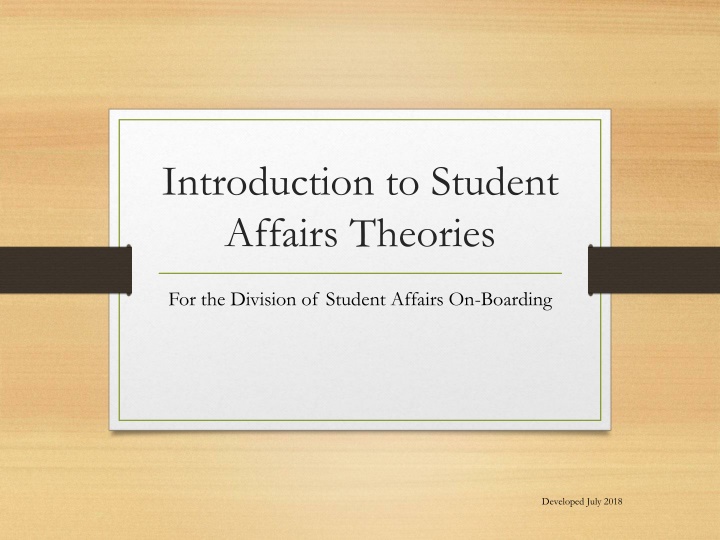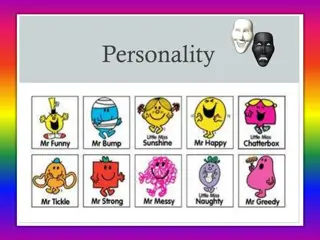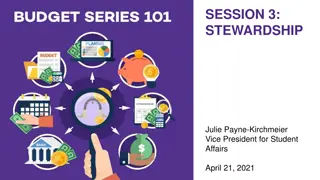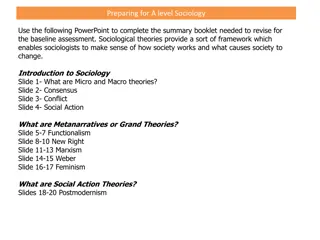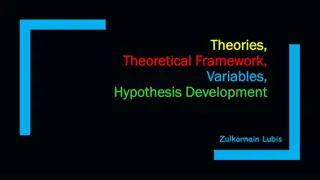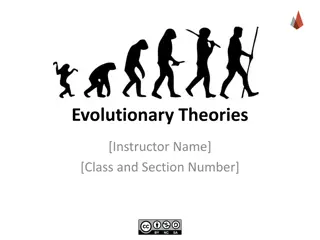Comprehensive Overview of Student Affairs Theories
This collection explores key theories in student affairs, including cognitive-structural theories, learning theories, and person-environment theories. Cognitive-structural theories delve into how individuals process information, while learning theories examine how people absorb knowledge. Person-environment theories focus on the impact of surroundings on individuals. Notable theories such as Belenky, Clinchy, Goldberger, and Tarule's "Women's Ways of Knowing" and Bloom's Taxonomy of Learning are discussed, providing insights into identity development and educational assessment models.
Download Presentation

Please find below an Image/Link to download the presentation.
The content on the website is provided AS IS for your information and personal use only. It may not be sold, licensed, or shared on other websites without obtaining consent from the author.If you encounter any issues during the download, it is possible that the publisher has removed the file from their server.
You are allowed to download the files provided on this website for personal or commercial use, subject to the condition that they are used lawfully. All files are the property of their respective owners.
The content on the website is provided AS IS for your information and personal use only. It may not be sold, licensed, or shared on other websites without obtaining consent from the author.
E N D
Presentation Transcript
Introduction to Student Affairs Theories For the Division of Student Affairs On-Boarding Developed July 2018
Cognitive - Structural Theories Definition Theories that explain how people process and understand information. This includes comparative thinking structures like classifying things, symbolic representation structures like dance and gestures, and logical reasoning structures like evaluation and problem solving. Developed July 2018
Cognitive - Structural Theories Belenky, Clinchy, Goldberger, and Tarule sWomen s Ways of Knowing (1986) Women s "ways of knowing" focuses on identity and intellectual development across a broad range of contexts of women. The authors describe additional knowledge perspectives and explain gender-related influences on cognitive development in women. Baxter-Magolda Theory of Self-Authorship (2001) Self- authorship consists of three dimensions in which young adults create knowledge construction, develop a personal identity, and form relationships with others. The process begins in post-adolescence with actualization completed by age 30. Developed July 2018
Learning Theories Definition Theories describe conceptual frameworks that describe how people absorb, process, and retain information during the learning process. They recognize that cognitive, emotional, environmental, and prior experiences all play a role in the learning process. Developed July 2018
Learning Theories Bloom s Taxonomy of Learning (1956) Three domains of learning: Cognitive, Affective, Psychomotor Use this as Knowledge, Attitudes, and Skills model for designing programs and services for college students, and for supervising staff. Kolb s Theory of Experiential Learning (1984) Looks at how one learns as an individual in relation to the development of self. Knowing what one needs to do to learn makes it easier for one to grow as a person. Developed July 2018
Person-Environment Theories Definition These theories how a person is impacted by the environment they are in. An environment that supports the desires and abilities of a person is a good fit. Arguably the most used theories in the profession. Developed July 2018
Person-Environment Theories Alexander Astin s I-E-O Model (1985) Educational assessments must include information on student inputs (I), the educational environment (E), and student outcomes (O). This model highlights the environmental impacts on student outcomes. Maslow s Hierarchy of Needs (1954) Students share needs common to all people. These needs go from basic (Physiological) to complex (Self-actualization). most traditional college-aged students are reaching out for new values, ideas, motivations, and purposes. Developed July 2018
Person-Environment Theories Alexander Astin s Theory of Student Involvement (1985) The most basic tenet of Astin's Theory of Involvement is that students learn more the more they are involved in both the academic and social aspects of the collegiate experience. Sanford Challenge & Support Theory (1962, 1966) A person needs a balanced amount of challenge and support for a task. They will never learn, grow, and develop with too much support. They will become frustrated and possibly quit if challenged too much. A person cannot grow ready to grow. Developed July 2018
Person-Environment Theories Unconditional Positive Regard Assumes that for healthy development, an individual needs an environment that provides genuineness, acceptance, and empathy. Unconditional positive regard therefore means valuing the person as doing their best to move forward in their lives constructively and respecting the person s right to self-determination no matter what they choose to do. Unconditional positive regard does not mean you must like a person or approve of what they have done. Developed July 2018
Identity Theories Definition Theories that address the behaviors, emotions and thought patterns that are unique to a person. Identity can be general and unique (who am I?) or multiple (what are my identity components?). Developed July 2018
Identity Theories: General Identities Josselson s Theory of Identity Development in Women (1996) Chickering and Reisser s Theory of Identity Development (1993) An expand theory including additional research on gender, race, and non- traditional students. The resulting model identifies seven vectors that provide a comprehensive representation of the development that occurs during the collegiate years. Explores why some women encounter a crisis, and whether or not they integrate that into their identity. Women fit into one of four groups based on experiencing a crisis and commitment of identity. Developed July 2018
Identity Theories: Racial Cultural Models Cross Model of Psychological Nigrescence (2010) Explains how Blacks come to conceptualize their racial and ethnic identity. For Black students, the process of adult nigrescence is heavily influence by the college. Kim s Asian American Identity Development Model (1981) A model that emphasizes racial identity and external influences, such as traditional Asian family and cultural values. These areas likely affect how Asian American students see themselves as individuals, in relation to others, and their life purpose. Developed July 2018
Identity Theories: Racial Cultural Models Torres s Model of Hispanic Identity Development (2003) Ethnic identity is the maintenance of a culture. The model recognizes the influences of where one grew up, generational status, and self-perception of societal status on identity development of Latino college students. Helms White Racial Identity Development Model (1995) A theory of majority (Caucasian) member cultural awareness that helps explain how the majority group, by virtue of its control of the economic and cultural dimensions of our society, directly and adversely affects minority groups and itself indirectly. Developed July 2018
Identity Theories: Racial Cultural Models Renn Ecological Model of Multiracial Identity Development (2003) Renn (2003) argued that an ecological perspective would better illustrate the development of mixed race students. Many models of identity formation for college students focus on a student s transition through stages. Application of these stage models to minority students or those students of mixed race can be problematic because of the different types of social and environmental influences to which they are exposed. Developed July 2018
Identity Theories: LGBTQIAA Theories Beemyn and Rankin s The Lives of Transgender People (2011) D Augelli Model of Lesbian, Gay, Bisexual Development (1994) This model suggests identity is influenced by one s social environment and the support one receives while beginning to conceptualize his/her sexuality. The process is not linear, but rather a complex evolution that occurs over one s life span. Describes the development of a transgender identity. Transgender identity development is a lifespan process, allowing for a multidimensional, fluid understanding for how a person s identity is influenced by experiences and specific contexts. Developed July 2018
Identity Theories: Faith, Religion, and Meaning Making Theory Dolaz Parks Faith Development Theory (2000) Faith as defined by Parks is, the activity of seeking and discovering meaning in the most comprehensive dimensions of our experience (Parks, p. 7). Parks developed four periods associated with faith development: adolescent/conventional, young adult, tested adult, and mature adult. As individuals develop they have new ways of understanding, which Parks refers to as forms of knowing. These forms are authority-bound, unqualified relativism, probing commitment, tested commitment, and conviction commitment. Developed July 2018
Morals, Ethics, and Personality Theories Definition Theories that address how morals. ethics, and personality are integrated to form the character of a person. Developed July 2018
Morals, Ethics, and Personality Theories Gilligan s Theory of Women s Moral Development (1982) Concerning moral development, men focused on rules, rights, and justice; women focused on relationships. The theory s focus is on the relationship one has with others and how those relationships impact one s understanding of self. Myer s-Briggs Type Inventory (1985) People have preferred approaches to interaction with others and making sense of the environment. Gradually, people identify that personality types may shift slightly depending on the context and can shift across the lifespan. Developed July 2018
References Sanford, N. (1962). The American college. New York: Wiley. Sanford, N. (1966). Self and society: Social change and individual development. New York: Atherton. Student Development Theories: A Primer, For use in the College Student Personnel Administration Program Southern Illinois University Edwardsville, Dr. Pietro Sasso, Edited in 2017 by Meagan T. Arnold Rogers, Carl. (1959). A theory of therapy, personality and interpersonal relationships as developed in the client-centered framework. In S. Koch (Ed.), Psychology: A Study of a Science. Vol. 3: Formulations of the Person and the Social Context. New York, NY: McGraw Hill. - Unconditional Positive Regard Developed July 2018
